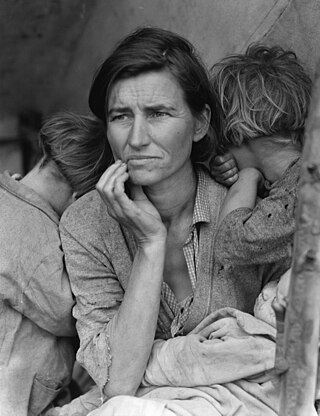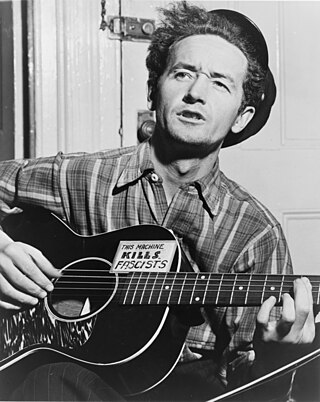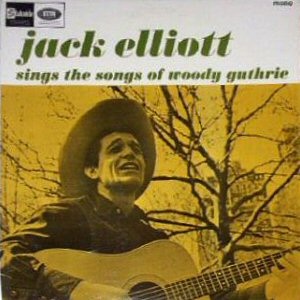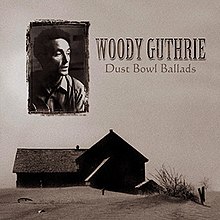
Woodrow Wilson Guthrie was an American singer-songwriter and composer who was one of the most significant figures in American folk music. His work focused on themes of American socialism and anti-fascism. He inspired several generations both politically and musically with songs such as "This Land Is Your Land".

The Grapes of Wrath is an American realist novel written by John Steinbeck and published in 1939. The book won the National Book Award and Pulitzer Prize for fiction, and it was cited prominently when Steinbeck was awarded the Nobel Prize in Literature in 1962.

An Okie is a person identified with the state of Oklahoma, or their descendants. This connection may be residential, historical or cultural. For most Okies, several of these connections exist and are collectively the source of their being Oklahoman. While not an official demographic used or recognized by the United States Census Bureau, Okies, due to various factors, have developed their own distinct culture within larger social groupings both akin to and separate from Midwestern and Southern influences. Included are their own dialect, music, and Indigenous-derived folklore.

Ramblin' Jack Elliott is an American folk singer and songwriter and musician.
"Pastures of Plenty" is a 1941 composition by Woody Guthrie. Describing the travails and dignity of migrant workers in North America, it is evocative of the world described in John Steinbeck's The Grapes of Wrath. The tune is based on the ballad "Pretty Polly", a traditional English-language folk song from the British Isles that was also well known in the Appalachian region of North America.

"The Ghost of Tom Joad" is a folk rock song written by Bruce Springsteen. It is the title track to his eleventh studio album, released in 1995. The character Tom Joad, from John Steinbeck's classic 1939 novel The Grapes of Wrath, is mentioned in the title and narrative.
Pretty Boy Floyd (1904–1934) was an American bank robber.

The American folk music revival began during the 1940s and peaked in popularity in the mid-1960s. Its roots went earlier, and performers like Josh White, Burl Ives, Woody Guthrie, Lead Belly, Big Bill Broonzy, Richard Dyer-Bennet, Oscar Brand, Jean Ritchie, John Jacob Niles, Susan Reed, Paul Robeson, Bessie Smith, Ma Rainey and Cisco Houston had enjoyed a limited general popularity in the 1930s and 1940s. The revival brought forward styles of American folk music that had in earlier times contributed to the development of country and western, blues, jazz, and rock and roll music.

"Do Re Mi" is a folk song by American songwriter Woody Guthrie. The song deals with the experiences and reception of Dust Bowl migrants when they arrive in California. It is known for having two guitar parts, both recorded by Guthrie.

American singer-songwriter Woody Guthrie's published recordings are culled from a series of recording sessions in the 1940s and 1950s. At the time they were recorded they were not set down for a particular album, so are found over several albums not necessarily in chronological order. The more detailed section on recording sessions lists the song by recording date.

Jack Elliott Sings the Songs of Woody Guthrie is an album by American folk musician Ramblin' Jack Elliott, released in September 1960. It consists of songs written or well known as performed by Woody Guthrie.

Thinking of Woody Guthrie was released in 1969 by Vanguard Records and is the debut solo album of Country Joe McDonald, best known for his work with Country Joe & the Fish. It was a different approach by McDonald to release a folk music and country album in the style of Woody Guthrie. Prior to this solo release, he was known to make albums in a psychedelic style with his band. The album was a tribute to the work of Woody Guthrie, a country and folk musician who died two years earlier. All of the tracks on the album were either composed or performed by Guthrie. McDonald was heavily influenced by Guthrie since he was a child. McDonald could recall his interest of Guthrie came first when his parents played Guthrie's first album, Dust Bowl Ballads. Even though McDonald has issued several albums in his career, he looks to this album as the piece he is most proud of.

Woody Guthrie's Blues is an album by American folk musician Ramblin' Jack Elliott, released in 1956 in Great Britain.

Woody At 100: The Woody Guthrie Centennial Collectionis a 150-page large-format book with three CDs containing 57 tracks, including Woody Guthrie's most important recordings such as the complete version of "This Land Is Your Land," "Pretty Boy Floyd," "I Ain't Got No Home in This World Anymore," and "Riding in My Car." The set also contains 21 previously unreleased performances and six never-before-heard original songs, including Woody's first known—and recently discovered—recordings. It is an in-depth commemorative collection of songs, photos and essays released by Smithsonian Folkways in June 2012.
"Ain't Got No Home" is a song by Woody Guthrie, released on Dust Bowl Ballads, in which the singer laments the difficulties that life presents him. It was based on a gospel song Guthrie heard on his visits to the migrant camps known variously as "Can't Feel at Home" or "I Don't Feel at Home in This World Anymore", which had been made popular by the Carter Family in 1931.

Struggle is an album released by Folkways Records as a vinyl LP in 1976 and as a CD in 1990. It contains recordings by folk artist Woody Guthrie, accompanied on some of the tracks by Cisco Houston and Sonny Terry. Songs on this album are commonly referred to as protest music, songs that are associated with a movement for social change.

Bound for Glory is a 1956 album by Woody Guthrie and Will Geer. It consists of a selection of songs from Guthrie's Dust Bowl Ballads of 1940 and his Asch recordings of 1944–45, each introduced briefly by Geer with spoken relevant extracts from Guthrie's writings.
"Vigilante Man" is a song by Woody Guthrie, recorded and released in 1940 as one of his Dust Bowl Ballads.
Jeff Place is the Grammy Award-winning writer and producer and a curator and senior archivist with the Smithsonian Center for Folklife and Cultural Heritage. He has won three Grammy Awards and six Indie Awards.

Leadbelly Sings Folk Songs is a remastered compilation album of American folk songs sung by legend Leadbelly accompanied by Woody Guthrie, Cisco Houston, and Sonny Terry, originally recorded by Moses Asch in the 1940s and re-released in 1989 by Folkways Records.















